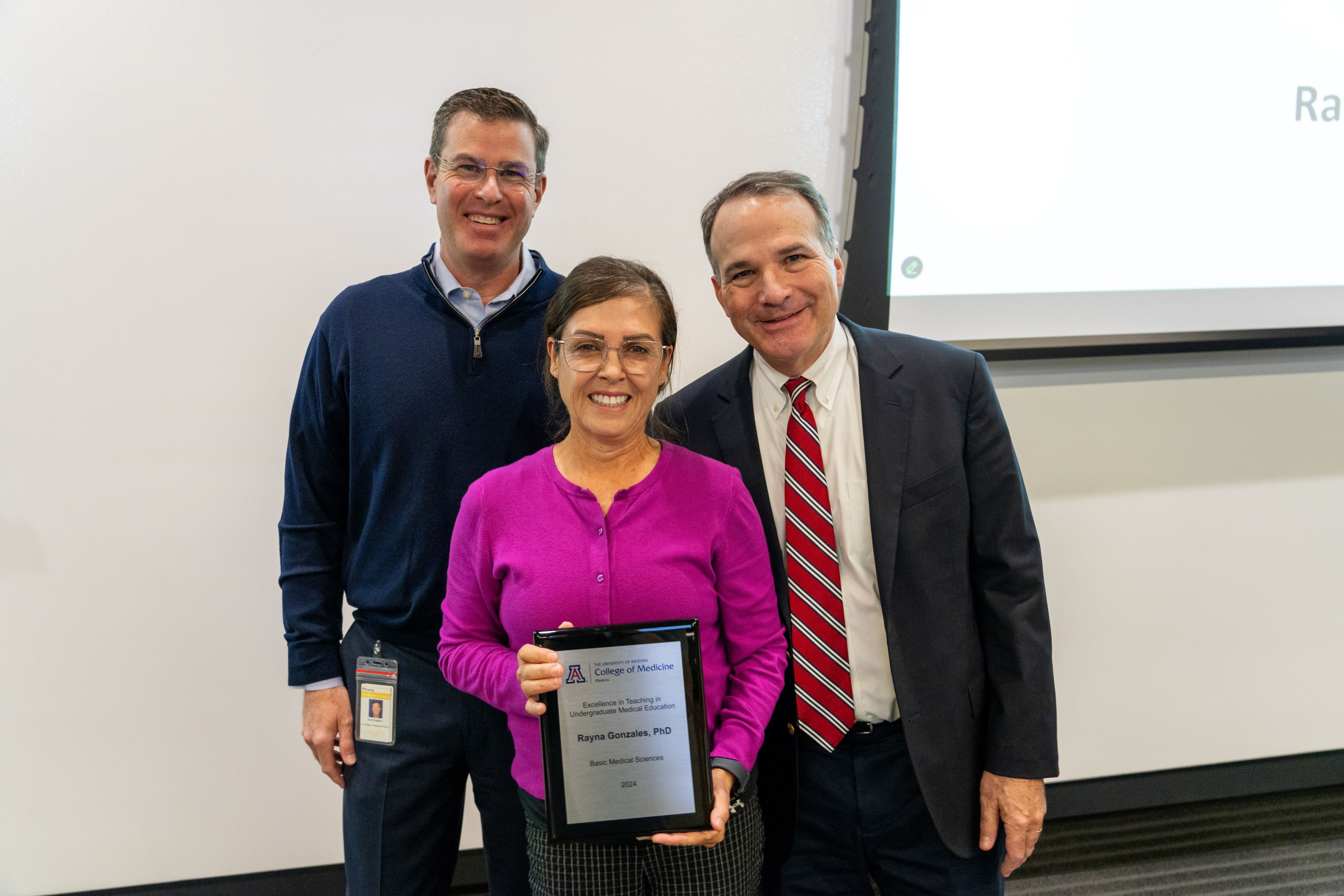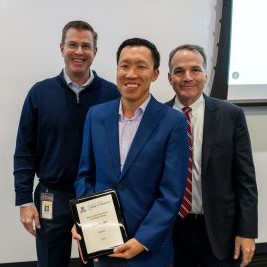
The 4th Annual Faculty Peer Awards Celebrated Stellar Mentors and Researchers

Each year, faculty at the University of Arizona College of Medicine – Phoenix nominate and recognize the outstanding work of their colleagues through peer-nominated faculty awards.
On November 6, the 4th annual faculty awards were presented at the General Faculty Meeting. Seven faculty were honored for their outstanding contributions to medicine in service, teaching, leadership and research.
“These awards are so important for our faculty,” said Ken Knox, MD, professor in the college’s Department of Internal Medicine and vice dean for Academic and Faculty Affairs. “There is perhaps no better feeling than to be nominated by your peers for recognition of outstanding service to the college and the community.”

Jacob Anderson, DO, an associate clinical professor in the Department of Family, Community & Preventive Medicine received the Community Service Award for his dedication in leading students to pursue further academic success.
The Community Service Award is given to a faculty member whose contributions to the local, regional or global community exemplify a commitment to improving the welfare of communities.
Dr. Anderson developed a hands-on curriculum that connects students with medical residents, which fostered diverse representation in health care.
The Outstanding Peer Mentorship Award honors a faculty member for sustained mentorship, fostering mentee success in research or teaching, and demonstrating a professional relationship with national or international impact.
Sandra Gage, MD, PhD, an associate clinical professor in the Department of Child Health, received the Outstanding Peer Mentorship Award for supporting research, publication and academic growth, leading an establishment of a culture of collaboration.
Dr. Gage mentored faculty across career stages at Phoenix Children’s, which increased the division’s academic output. Her mentorship has enabled faculty to achieve national presentations and apply for professorships.
The Early Career Excellence in Education Award recognizes a faculty member for activities and achievements showing promise for future contributions to medical education for students, residents, or fellows.
This year’s recipient was Claudia Yeung, MD, assistant clinical professor in the Department of Child Health, for her dedication to the academic and personal growth of trainees.
According to her peers, Dr. Yeung has led impactful changes in the Pediatric Emergency Medicine Fellowship, improving board pass rates and mental health support. She developed a core faculty system, well initiatives and national conference attendance for fellows.
The Excellence in Educational Innovation Award is bestowed upon a faculty member who integrates innovation and active learning methods, inspire curricular improvements, and provide engaging learning experiences with excellent evaluations.
Julie Augenstein, MD, an associate clinical professor in the Department of Child Health, Division of Emergency Medicine, received the award for her activity in pediatric emergency medicine education.
Dr. Augenstein also created the “Simbulance” project, which is a mobile simulation unity for emergency medical services (EMS) trainees. She also drives collaboration across health care teams and continually improves EMS education.
The Excellence in Teaching in Graduate Medicine Education celebrates outstanding clinical teaching and mentorship for residents or fellows, evidenced by participation in faculty development and contributions to teaching materials.
This is an endowed award made possible by a gift from Ronald P. Hammer, Jr., PhD, and Sandra Jacobson, MD. The recipient for this award must be a full-time faculty member involved in graduate education at the college.
This year’s recipient is Kristina Balangue, MD, an assistant clinical professor in the Department of Internal Medicine, Division of Geriatrics/Palliative Care. Dr. Balangue created a clinical skills curriculum for difficult conversations with patients and their loved ones.
Dr. Balangue has also mentored students and fellows in patient-centered communication and interdisciplinary collaboration.
The Excellence in Teaching in Undergraduate Medical Education acknowledges exemplary teaching and mentorship in undergraduate medical education, supported by evidence of faculty development, teaching material creation or tangible student outcomes.
Rayna Gonzales, PhD, an associate professor in the Department of Basic Medical Sciences, received the award for being a key player in developing the college’s clerkship curriculum.
Dr. Gonzales is also recognized by her peers for passionate teaching and commitment to cultural competency in education. She is known for her mentorship of students in research, many of whom have won academic awards and recognition.
The Early Career Excellence in Research Award is given to a faculty member who demonstrates the potential for research excellence. This year’s recipient is Jack He, MD, from the college’s surgery department for his leadership that strengthened research mentorship within the department.
Dr. He rapidly established a research profile in trauma surgery, mentoring numerous students and residents.
The Educational Research Award recognizes a faculty member for significant educational research, typically demonstrated through peer-reviewed publications and documented efforts in this field.
This year’s recipient is Christopher Burns, PhD, professor in the Department of Basic Medical Sciences, for his innovation in medical education research and contributions in nutrition and active learning.
Dr. Burns mentored students in educational research projects and received multiple awards for research excellence.
The Excellence in Research Award is given to a faculty member who demonstrates high-quality research and publications throughout their career. This year’s recipient is Shenfeng Qiu, PhD, MD, a tenured professor in the Department of Basic Medical Sciences.
Dr. Qiu is the leading researcher in neurodevelopmental disorders with over 60 publications. He has contributed over $7 million in lab expenditures and supports collaborative research. He also made a biomedical imaging core for faculty and student research development.
Topics
About the College
Founded in 2007, the University of Arizona College of Medicine – Phoenix inspires and trains exemplary physicians, scientists and leaders to advance its core missions in education, research, clinical care and service to communities across Arizona. The college’s strength lies in our collaborations and partnerships with clinical affiliates, community organizations and industry sponsors. With our primary affiliate, Banner Health, we are recognized as the premier academic medical center in Phoenix. As an anchor institution of the Phoenix Bioscience Core, the college is home to signature research programs in neurosciences, cardiopulmonary diseases, immunology, informatics and metabolism. These focus areas uniquely position us to drive biomedical research and bolster economic development in the region.
As an urban institution with strong roots in rural and tribal health, the college has graduated more than 1,000 physicians and matriculates 130 students each year. Greater than 60% of matriculating students are from Arizona and many continue training at our GME sponsored residency programs, ultimately pursuing local academic and community-based opportunities. While our traditional four-year program continues to thrive, we will launch our recently approved accelerated three-year medical student curriculum with exclusive focus on primary care. This program is designed to further enhance workforce retention needs across Arizona.
The college has embarked on our strategic plan for 2025 to 2030. Learn more.